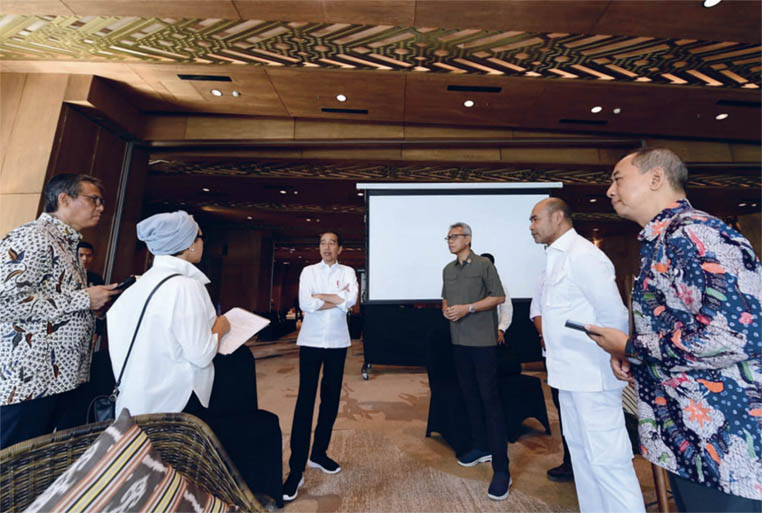
The draft is entitled “ASEAN Leaders’ Declaration on Strengthening Food Security and Nutrition in Times of Crises.” It was deemed a fitting title, given that food security during a crisis is a broad issue beyond production and even an economic pillar; all related sectors in ASEAN must embrace the same spirit to ensure that food security and supply chain of agricultural and food commodities in the region are protected.
Currently, ASEAN sets several high-level meetings involving ASEAN Economic Ministers (AEM), ASEAN Transport Ministers (ATM), ASEAN Ministers on Agriculture and Forestry (AMAF), as well as ASEAN Integrated Food Security (AIFS) framework and Strategic Plan of Action on Food Security (2016-25), with an emphasis on efforts to create a competitive, inclusive, resilient and sustainable “Food, Agriculture and Forestry (FAF) sector integrated with the global economy, based on a single market and production base, contributing to food and nutrition security and prosperity in the ASEAN Community” with a focus on food security (Strategic Thrust/ST 3 & 6). ST 3 aims to ensure food security, better nutrition, as well as equitable distribution, while ST 6 aims to increase resilience against and contribute to the mitigation and adaptation to climate change, natural disasters and other shocks.
Furthermore, there is the: (1) ASEAN Food Security Reserve Board (AFSRB), tasked with reviewing, monitoring and evaluating food security in the region and globally; (2) ASEAN Food Security Information System (AFSIS), to strengthen food security in the region through systematic collection of data, analysis and dissemination of information related to food security; (3) ASEAN Plus Three Emergency Rice Reserve (APTERR) which was established as a permanent mechanism to strengthen food security by ensuring the availability of rice, especially during emergencies such as natural disasters, the Covid-19 pandemic and food crisis; and others, involving other relevant AMAF subsidiary bodies.
However, there is yet to be a mechanism to ensure food security in times of crisis. In addition, the implementation of these agreements has been slow, so their utilization is less effective and their impact is not yet tangible.
Thus, during its 2023 chairmanship, Indonesia proposes to unite the roles of all relevant sectors in strengthening a food supply chain and logistics system in the region, and increase the efficiency of the mechanism and integration of cross-sectoral negotiations with the ASEAN structure, by encouraging commitment at the highest level through ASEAN Leaders’ Declaration. It is hoped that this can serve as an alternative to achieving an efficient negotiation mechanism and integration. The expected impact of implementing this policy is an agreed mechanism to manage food availability and accessibility in anticipating the risk of food insecurity in the region, resulting from a global food crisis.
According to experts, the issues that need to be discussed and agreed upon by the leaders of ASEAN comprise the following points:
1. Calling on all parties to be aware of the critical situation with regard to food security faced by the region as a result of climate change, the Covid-19 pandemic and geopolitical tensions.
2. Affirming the urgency of a joint commitment by all stakeholders, especially in the economic sector, with regard to agriculture, food production, trade and the logistics system to ensure smooth distribution of agricultural and food commodities in the region during times of crisis, and increase regional resilience to prepare for future shocks.
3. Emphasizing the importance of AEM and AMAF in ensuring regional food security under a free trade agreement, as well as ensuring the continuity of a food security agenda, in discussions connected with ASEAN Trade in Goods Agreement (ATIGA).
4. Encouraging strategic collaboration with all ASEAN dialogue partners to support efforts to achieve food security.
5. Building the foundation for the development of an integration roadmap and send positive messages to ASEAN and the global community about ASEAN’s strong commitment to ensure food security and protect the supply chain of agricultural and food products.
The outcomes of said agreements will draw stakeholders’ attention to urgent matters and serve as the basis for programs and/or policies to: (1) ensure sustainable production and the continuous flow of goods; (2) protect regional food supply chains; and (3) ensure the smooth distribution of food and agricultural commodities, logistics-wise. The immediate outcomes will be in the form of policy recommendations for declarations to be acted upon by related agencies/sectors.

